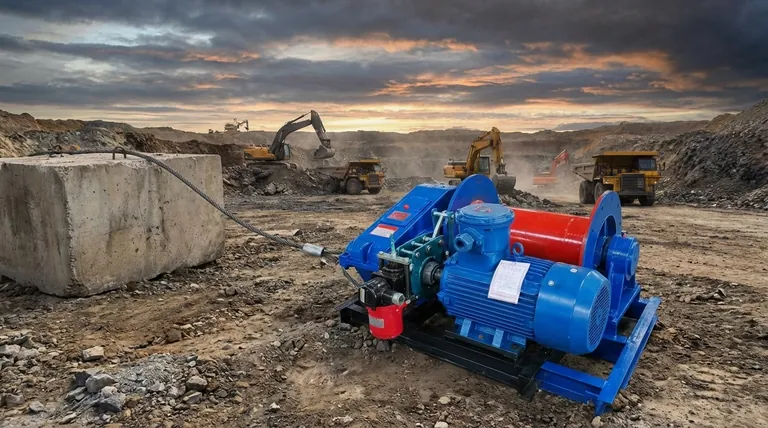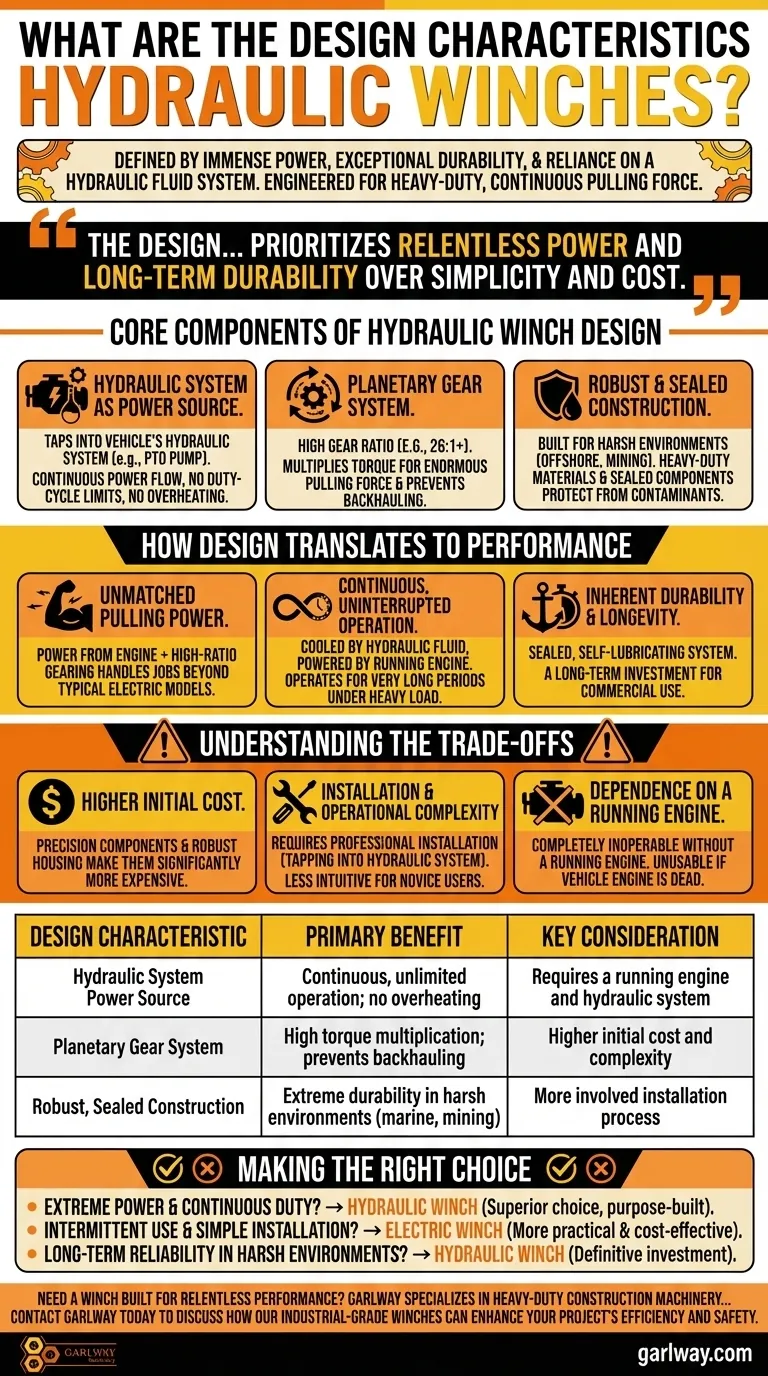At their core, hydraulic winches are defined by immense power, exceptional durability, and their reliance on a hydraulic fluid system. Unlike electric models, they are engineered specifically for the most demanding, heavy-duty tasks where continuous, reliable pulling force is non-negotiable.
The design of a hydraulic winch deliberately prioritizes relentless power and long-term durability over simplicity and cost. This makes it the definitive tool for industrial applications where failure is not an option.

The Core Components of Hydraulic Winch Design
The performance characteristics of a hydraulic winch are a direct result of its fundamental design choices, centered around its power source and mechanical advantage system.
The Hydraulic System as a Power Source
A hydraulic winch does not generate its own power. Instead, it taps into a running hydraulic system, typically a vehicle's power steering pump or a dedicated power take-off (PTO) pump.
This design provides a continuous and powerful flow of energy as long as the engine is running, eliminating the duty-cycle limitations and potential for overheating common in electric winches.
The Planetary Gear System
Most hydraulic winches use a planetary gear system with a high gear ratio, often 26:1 or greater.
This gearing is critical for two reasons. First, it multiplies the torque from the hydraulic motor, translating it into enormous pulling force. Second, the high ratio helps prevent the load from "backhauling," or pulling the line back out when power is not being applied.
Robust and Sealed Construction
These winches are built to survive in the harshest environments, from offshore oil rigs to mining operations.
Their construction emphasizes heavy-duty materials and sealed components to protect the internal motor and gearing from water, salt, dirt, and other contaminants, ensuring long-term reliability.
How Design Translates to Performance
The combination of these design elements gives hydraulic winches a distinct performance profile tailored for specific, demanding scenarios.
Unmatched Pulling Power
The direct connection to a vehicle's engine via the hydraulic pump, combined with high-ratio gearing, gives these winches the power to handle jobs that are far beyond the capacity of typical electric models.
Continuous, Uninterrupted Operation
Because they are cooled by the circulating hydraulic fluid and powered by a running engine, hydraulic winches can operate for very long periods under heavy load. This is essential for industrial tasks that require sustained pulling.
Inherent Durability and Longevity
The heavy-duty construction and reliance on a sealed, self-lubricating hydraulic system mean these winches are likely to last for a very long time with proper maintenance. They are built as a long-term investment for commercial use.
Understanding the Trade-offs
While powerful, the design of a hydraulic winch comes with specific limitations that make it unsuitable for certain users.
Higher Initial Cost
The precision components of the hydraulic motor, planetary gear set, and robust housing make these winches significantly more expensive than their electric counterparts.
Installation and Operational Complexity
Installing a hydraulic winch is more involved than bolting on an electric model. It requires tapping into an existing hydraulic system, which often requires professional installation. Operation can also be less intuitive for novice users.
Dependence on a Running Engine
A hydraulic winch is completely inoperable without a running engine to power the hydraulic pump. This makes it unusable for recovery situations where the vehicle's engine is dead.
Making the Right Choice for Your Application
Selecting the correct winch type depends entirely on the demands of your work environment and the nature of the tasks you perform.
- If your primary focus is extreme power and continuous duty: The hydraulic winch is the superior choice, as its design is purpose-built for sustained, heavy-duty industrial work.
- If your primary focus is intermittent use and simple installation: An electric winch is a more practical and cost-effective solution for recreational or light commercial tasks.
- If your primary focus is long-term reliability in harsh environments: The sealed, robust construction of a hydraulic winch makes it the definitive investment for marine, mining, or heavy construction settings.
Ultimately, understanding these core design principles allows you to select the right tool that truly matches the demands of your job.
Summary Table:
| Design Characteristic | Primary Benefit | Key Consideration |
|---|---|---|
| Hydraulic System Power Source | Continuous, unlimited operation; no overheating | Requires a running engine and hydraulic system |
| Planetary Gear System | High torque multiplication; prevents backhauling | Higher initial cost and complexity |
| Robust, Sealed Construction | Extreme durability in harsh environments (marine, mining) | More involved installation process |
Need a winch built for relentless performance?
GARLWAY specializes in heavy-duty construction machinery, providing robust hydraulic winches, concrete mixers, and batching plants for construction companies and contractors globally. Our hydraulic winches are engineered for maximum power, continuous duty, and long-term reliability in the toughest environments.
Contact GARLWAY today to discuss how our industrial-grade winches can enhance your project's efficiency and safety.
Visual Guide

Related Products
- Electric and Hydraulic Winch for Heavy Duty Applications
- Hydraulic Concrete Mixer Machine Cement Mixing Equipment for Mixture Concrete
- JDY350 Electric Hydraulic Mortar Mud Concrete Mixer
- Small Electric Winch 120V and 240V for Compact Applications
- Electric 120V Boat Winch by Badlands
People Also Ask
- What is the general sentiment about the importance of having a winch? Essential for Off-Road & Work Safety
- What is the origin of the term 'windlass'? Uncovering the Ancient Mechanics of a Winding-Pole
- How do you choose the right size winch? Master the 1.5x GVWR Rule for Safe Recovery
- What are the key safety considerations when using a winch? Master the 3 Pillars for Safe Operation
- What are the main advantages of electric winches? Unlock Simplicity, Control & Efficiency
- Why is an anchoring system important for boats? Secure Your Vessel with Ultimate Control & Safety
- How do industrial winches contribute to heavy lifting operations? Achieve Safe & Precise Load Handling
- How are winches integrated into waste management? Boost Efficiency & Safety in Your Fleet



















